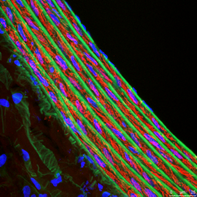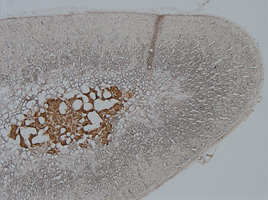Hypertension
Hypertension (high blood pressure) is one of the civilisation illnesses that accompany unhealthy lifestyle and spreading obesity.
Furthermore, genetic predispositions and increasing age of population play a role. Untreated hypertension can lead to other disorders of cardiovascular system (atherosclerosis, stroke, or ischemic heart disease).
In order to explain the development of hypertension, we study rats harbouring both genetic and experimental forms of this disease. We investigate effects of exogenous factors in combination with genetic predispositions during the ontogenetic development. We also try to describe mechanisms of vascular contraction and the role of vasoconstriction and vasodilatation systems in the regulation of blood pressure.
 |
 |
|||
|
Aorta section: alpha-actin detected with a specific antibody (red), cell nuclei (blue), autofluorescence (green). |
This adrenal section shows tyrosine hydroxylase in adrenal medulla, which is an enzyme that catalyses the key reaction of catecholamine synthesis. Catecholamines are hormones that contribute to the regulation of blood pressure. |
